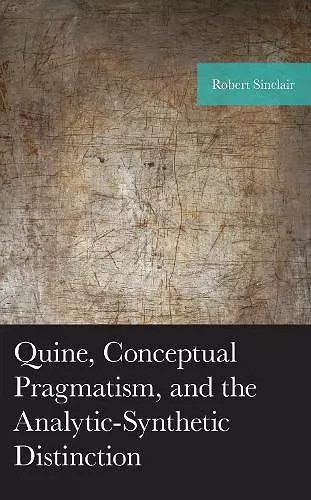Quine, Conceptual Pragmatism, and the Analytic-Synthetic Distinction
Format:Hardback
Publisher:Bloomsbury Publishing PLC
Published:1st Aug '22
Currently unavailable, and unfortunately no date known when it will be back

W. V. Quine’s occasional references to his ‘pragmatism’ have often been interpreted as suggesting a possible link to the American Pragmatism of Peirce, James, and Dewey. Quine, Conceptual Pragmatism, and the Analytic-Synthetic Distinction argues that the influence of pragmatism on Quine’s philosophy is more accurately traced to his teacher C.I. Lewis and his conceptual pragmatism from Mind and the World Order, and his later An Analysis of Knowledge and Valuation. Quine’s epistemological views share many affinities with Lewis’s conceptual pragmatism, where knowledge is conceived as a conceptual framework pragmatically revised in light of what future experience reveals. Robert Sinclair further defends and elaborates on this claim by showing how Lewis’s influence can be seen in several key episodes in Quine’s philosophical development. This not only highlights a forgotten element of the epistemological backdrop to Quine’s mid-century criticism of the analytic-synthetic distinction, but Sinclair further argues that it provides the central epistemological framework for the form and content of Quine’s later naturalized conception of epistemology.
In presenting a historical overview of Quine’s philosophical response to Lewis’ conceptual pragmatism, Sinclair offers a fresh perspective on the interplay between pragmatism and analytic philosophy in the mid-twentieth century. This work broadens our knowledge about Quine’s development, deepens our understanding of his objections to the analytic-synthetic distinction, and sheds new light on his naturalized epistemology. Sinclair’s book, in sum, is a must read for all Quine scholars and a valuable recourse for historians of analytic philosophy. -- Sander Verhaegh, Tilburg University
In Quine, Conceptual Pragmatism and the Analytic-Synthetic Distinction, Robert Sinclair traces the often underappreciated influence of C.I. Lewis and his conceptual pragmatism on Quine’s early development. Starting with his graduate work, Sinclair details Quine’s growing discomfort with Lewis’s reliance on both the analytic-synthetic distinction and phenomenalism. While Quine was at first hopeful about analyticity, Sinclair shows how the exchanges with Lewis and Quine’s commitment to Lewis’s own style of pragmatism contribute to Quine’s rejection of the epistemological significance of the analytic-synthetic distinction and to his eventual move to naturalized epistemology. Emphasizing Lewis’s influence clarifies Quine’s claim to a more thorough pragmatism by taking us beyond just the typical focus on Carnap’s role. Further, tracing continuities between Lewis and Quine, Sinclair sheds useful light on the genesis and structure of Quine’s mature naturalism. Writing with clarity and a deft command of primary and secondary literature, Sinclair deepens and broadens our perspective on Quine’s development and a crucial period in the history of analytic philosophy. -- Paul Gregory, Washington and Lee University
Sinclair succeeds in pulling a rabbit out of a hat, the rabbit being Quine's epistemological position as it was voiced in his famous 'Two Dogmas of Empiricism' of 1950, with its apparent denial of (the epistemological importance of) the analytic-synthetic distinction, the hat being the early influence -- when Quine was a mere graduate student -- of C. I. Lewis, for whom maintenance of that distinction was vital. The trick is to see the influence of the pragmatic aspects of Lewis' thought on Quine -- which are sometimes 'rather striking' as Sinclair reports -- and to do so in a supremely detailed manner (and it helps to pull off the trick with such agreeably unpretentious prose). This results in a more rounded picture of the early Quine than thinking of Carnap (and Russell) as the only significant influences. -- Gary Kemp, University of Glasgow
Quine’s complex relations to American pragmatism have generated more heat than light – until now. Sinclair shows that much of Quine’s philosophical development can be understood in terms of his continual engagement with the conceptual pragmatism of C. I. Lewis. Despite rejecting key commitments of Lewis’s, such as intensions, the analytic-synthetic distinction, and the independence of the sensory given from conceptual interpretation, Quine remained far closer to Lewis than is generally recognized. Sinclair convincingly shows that even though Quine’s naturalized epistemology is at odds with Lewis’s conceptual pragmatism, one can plausibly understand naturalized epistemology as a more consistent articulation of Lewis’s methodological commitments. By reconstructing the Lewis-Quine relation in detail, Sinclair has given us a new reading of the one most influential of 20th century analytic philosophers. -- Carl B. Sachs, Marymount University
Robert Sinclair persuasively makes the case for C.I. Lewis’s key role in the development of Quine’s philosophy. Drawing upon Quine’s graduate papers, Lewis’s two major books in epistemology, and various correspondences, Sinclair excavates important connections between Lewis’s conceptual pragmatism and Quine’s naturalized epistemology. In emphasizing these connections and paying careful attention to central distinctions from Lewis’s long-neglected An Analysis of Knowledge and Valuation, Sinclair provides a fresh and insightful reading of, among other works, Quine’s “Two Dogmas of Empiricism.” This book not only advances our understanding of Quine, but also of Lewis and his essential place in the history of analytic philosophy. -- Paul L. Franco, University of Washington
ISBN: 9781793618207
Dimensions: 228mm x 161mm x 18mm
Weight: 417g
156 pages